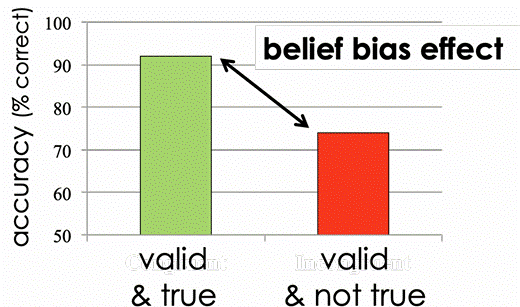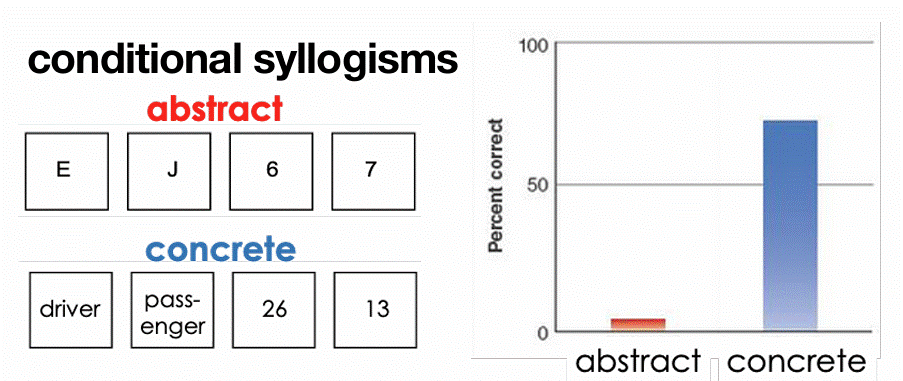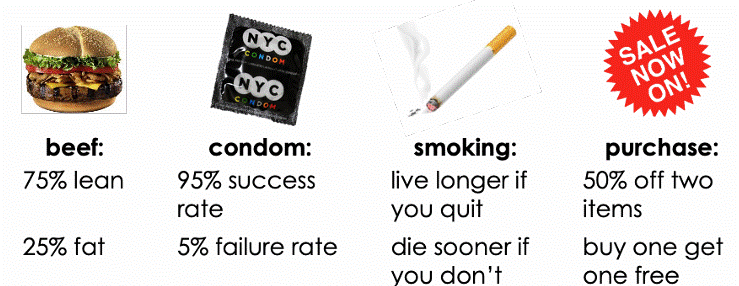Cognitive Exam 4 Decision making and reasoning
1/26
There's no tags or description
Looks like no tags are added yet.
Name | Mastery | Learn | Test | Matching | Spaced | Call with Kai |
|---|
No analytics yet
Send a link to your students to track their progress
27 Terms
elements of a decision
• judgment: to judge or form an opinion
• reasoning: the process of drawing conclusions
• decision: the process of choosing between alternatives
inductive reason
The process of drawing a general conclusion based on specific observations
ex: The temp in Riverside reaches 100 every summer. Therefore, it will reach 100 in Riverside this summer
• The premise (set up) is stated as observations of specific cases
The temp in Riverside reaches 100 every summer
• conclusion is generalized from premise
Therefore, it will reach 100 in Riverside this summer
• specific cases →broad principles
every summer, this summer
• if the premise is true, the conclusion is probably true
= Therefore, it will reach 100 in Riverside this summer
****bottom up processing:
facts/observation→hypothesis→theory
• if the premise is true, the conclusion is probably true
Inductive reasoning strengthening: Representativeness of observations
Question: How well will I do in Psych 134?
Who’s observations would lead to a more certain conclusion
Psych friends or business friends
Psych :)
how well observations about a particular category represent all members of that category
Inductive reasoning strengthening: number of observations
Question: How well will I do in Psych 134?
Who’s observations would lead to a more certain conclusion
three friends or hundreds of peers?
hundreds :)
how many observations are made
Inductive reasoning strengthening: quality of evidence
Question: How well will I do in Psych 134?
Who’s observations would lead to a more certain conclusion
observing friends or previous grade distributions?
previous grade distributions :)
observations can be supported by scientific evidence
Inductive reasoning weakening: confirmation bias
we look for information that supports our opinions and ignore information that refutes it
ex: Which question would help you determine if someone is an introvert?
what things do you like to do when you are alone? (SUPPORTS)
what do you like most about being with other people? (DISCONFIRMS)
ex: which set of numbers would help you determine the rule used to generate the sequence “2, 4, 6”?
8,10,12 (CONFIRMS)
1,2,3 (DISCONFIRMS)
****inductive arguments are weakened by a bias to confirm (or support) our opinions
Inductive reasoning weakening: myside bias
we evaluate evidence in a way that is biased toward our own opinions and attitudes
ex: capital punishment
group FOR capital punishment
“evidence of the deterring effect of capital punishment was convincing”
group AGAINST capital punishment
“evidence of the deterring effect of capital punishment was NOT convincing”
Inductive reasoning weakening: backfire effect
our support for a given opinion can be stronger when faced with facts that oppose it (DOUBLING DOWN)
ex: discussion with dad about truth/beliefs
ex: Climate change denial: Despite the overwhelming scientific evidence supporting the reality of climate change, some individuals continue to reject this evidence and deny the existence of climate change
Inductive reasoning and heuristics: availability heuristics
events that come to mind more easily are judged as being more probable
ex: are there more 4-letter English words with L as the 1st letter or 3rd letter?
ex: whats more likely to kill you in kansas: drowning or tornado?
ex: which is more likely to happen: death by shark attack or falling coconut?
undue weight is given to anecdotal evidence that comes to mind more easily
ex: I wanna buy a volvo but my mom said hers sucks
ex: will you vaccinate your kids
ex: after watching scary movie u think noise outside is zombie
Availability heuristics: illusory correlations
when a relationship between two events appears to exist, but, in reality, there is little or no relationship
ex: it always rains… …on the weekend
ex: it always rains… …after I wash my car
ex: stereotypes
Inductive reasoning and heuristics: representativeness heuristics
events that are more similar to a given category are more likely to be judged as being part of that category
• base-rate
• conjunction rule
• law of large numbers
Representativeness heuristic: base rate
the relative proportion of different classes in the population
ex: What does Cousin Joe do for a living?—COMEDIAN??
there are more doctors in the world than comedians but the description makes us think he is
Representativeness heuristic: conjunction rule
the probability of a conjunction of two events cannot be higher than the probability of the events alone
ex: which best describes my buddy Brent?
CEO of Chase
CEO of Chase and annual salary is at least 1000
****Then the conjunction A and B (Brent is CEO and makes at least $1000) is more specific, so it must be less likely or equally likely than either A or B alone.
Representativeness heuristic: law of large numbers
the more individuals that are randomly drawn from a population, the more representative the group will be of the entire population
You’re asked:
If you only bet on red, are you more likely to win if you play for 5 spins or 50 spins?
✅ Correct Answer: 50 Spins
Why? Because of the law of large numbers:
Over many trials (like 50 spins), the outcomes are more likely to reflect the actual probabilities — in roulette, red is close to 50%, so you’d expect around 25 reds.
This means your results will be more representative of the true odds.
Deductive reasoning
the process of determining whether a specific conclusion logically follows from general statements
ex: All men are mortal. Socrates is a man. Therefore, Socrates is mortal.
• premise is stated as facts or general principles
All men are mortal. Socrates is a man
• conclusion is drawn from logical rules applied to the premise
Therefore, Socrates is mortal.
• broad principles → specific cases
All men, Socrates
• if the premise is true, the conclusion is definitely true
= Therefore, Socrates is mortal
****top down processing
hypothesis→facts→conclusion
Deductive reasoning: Syllogism
consist of two broad statements (premises) and a conclusion
Deductive reasoning: Categorical Syllogism
statements being with “all”, “no”, or “some”
All teachers are inspiring. Prf. DZ is a teacher. ∴ Prf. DZ is inspiring.
Categorical Syllogism: Valid
the conclusion follows logically from the premises
****not all valid syllogisms are true
valid syllogism … and true
All dogs are animals. All animals eat food. ∴ all dogs eat food.
valid syllogism … but not true
All dogs are animals. All animals have wings. ∴ all dogs have wings
Categorical Syllogism: Invalid
the conclusion does not follow logically from the premises
invalid syllogism … though possibly true
All dogs are animals. Some animals are small. ∴ some of the dogs are small.
invalid syllogism … and not true
All dogs are animals. Some animals are in space. ∴ some of the dogs are in space
Deductive Reasoning: Belief bias
the tendency to think a syllogism is valid if its conclusions are believable

Deductive reasoning: Conditional Syllogism
the first premise has an “if…then” format
If I study, then I will get a good grade. I studied. ∴ I will get a good grade.
ex: If I give my dog double dinner every day, then they will gain weight I gave Izzie double dinner every day ∴ she gained weight
ex: If I give my dog double dinner every day, then they will gain weight Izzie did not gain weight ∴ I did not give her double dinner
ex: If I give my dog double dinner every day, then they will gain weight Izzie gained weight ∴ Izzie got double dinner every night
ex: If you are a doctor, then you finished college. You finished college. ∴ you are a doctor.
ex: If I give my dog double dinner every day, then they will gain weight I did not give Izzie double dinner every day ∴ she will not gain weight
ex: If you are a doctor, then you finished college. You are not a doctor ∴ you did not finish college
**** it is easier to see the the logic is invalid when using statements that also make it inaccurate
first two are valid
last two are invalid

Conditional syllogism: falsification principle
to test a rule, it is necessary to look for a situation that would falsify it
ex: which cards do you need to turn over to test the rule?
Which do you turn over to test the rule?
✅ A (vowel) — must have an even number on the other side to confirm the rule.
✅ 7 (odd number) — if there’s a vowel on the other side, it falsifies the rule.
🚫 4 — doesn’t matter what’s on the back. The rule doesn’t say only even numbers must have vowels.
🚫 D — not a vowel, so irrelevant.
✔ Answer: A and 7
ex: which cards do you need to turn over to test the rule?
You are a police officer. Each card represents a person in a car. One side shows whether the person is the driver and the other side shows their age. You must enforce the rule that if a person is driving, then they must be over 16 years old.
Rule: If someone is driving, then they must be over 16 years old.
Cards shown: driver, passenger, 26, 13Driving
Not driving
25 years old
13 years old
Which do you turn over?
✅ Driving — you need to check if they’re 16+
✅ 13 years old — you need to check if this person is driving
🚫 Not driving — irrelevant
🚫 25 years old — they meet the age requirement, no need to check
✔ Answer: Driving and 15 years old
****real life problems are easier to solve than abstract problems

decision making: expected utility theory
assumes if people have all relevant information, they will make a decision that results in outcomes that help to achieve their goals
framing effect
decisions are influenced by how the choices are stated

status quo bias
the tendency to do nothing when faced with making a decisios
ex: organ donor
OPT-IN (in red): You are not an organ donor by default — you have to choose to become one.
OPT-OUT (in green): You are an organ donor by default — you have to take action to decline.
risk aversion
the tendency to avoid taking risks
dual systems approach
idea that we may have different systems for decision makin